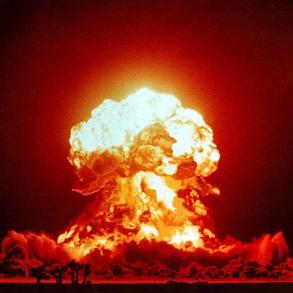
Obama's Nuclear Surprise
Leonid Ivashov
No examples of sacrificial service of the US elites to mankind or peoples of other countries can be discovered in the US history over the past century. Would it be realistic to expect the advent of an African-American president to the White House to change the country's political philosophy traditionally aimed at achieving global dominance? Those believing that something like that is possible should try to realize why the US – the country with a military budget already greater than those of all other countries of the world combined – continues spending enormous sums of money on preparations for war. Why is Washington actively spreading military activity to space, building up it its strategic non-nuclear forces, developing global missile defense, and converting its formerly nuclear-armed powerful Ohio-class submarines into carriers of cruise missiles with non-nuclear warheads? There are too many questions inviting obvious answers, and the answers combine into a picture showing that the US intentions are anything but peaceful.

Let us survey briefly the US strategy over the recent years. In 2002 G. Bush established a commission to survey the situation in the nuclear arms sphere. Its conclusions were the following:
- Russia in its current state does not present a nuclear threat to the US;
- The US nuclear weapons do not serve as an efficient instrument of implementing the US security strategy as they can neither protect the country from terrorist attacks nor be used to exert pressure on rogue states.
- While being a huge financial burden, maintaining the nuclear arsenals is not cost-efficient.
After heated debates sparked by the conclusions, Washington decided to slash the budget of the strategic nuclear forces and to focus on developing new generations of conventional warfare. As a compromise with the proponents of the pro-nuclear strategy and those still concerned over Russia and China as sources of nuclear threat, the US Administration made the decision to withdraw from the 1972 Anti-Ballistic Missile Treaty and to deploy a global missile shield.
In 2003, G. Bush approved the Prompt Global Strike concept. The same year the US officially scrapped the 1972 Anti-Ballistic Missile Treaty and established the Global Strike Command to which 450 system from the strategic nuclear forces were transferred upon conversion into precision means of delivery with conventional warheads. Work began on equipping 4 Ohio submarines to carry cruise missiles. The submarines' 24 Trident-2 submarine-launched ballistic missiles were replaced with 160 upgraded Tomahawks. The Trident-2 missiles were also upgraded to carry non-nuclear warheads. At the same time, efforts intensified to create a new class of strategic cruise missiles (with the 6,000 km range and the velocity reaching 6 Mach). An extensive program of deploying roughly 1,400 strategic missile defense installations was also implemented.
The Prompt Global Strike concept envisages a concentrated strike using several thousand precision conventional weapons in 2-4 hours that would completely destroy the critical infrastructures of the target country and thus force it to capitulate.
In 2009 the Prompt Global Strike initiative which used to be the favorite brainchild of G. Bush's Administration was inherited by B. Obama. The pragmatically minded new Administration reckoned that it made no sense to spend a lot on nuclear weapons that were impossible to use in practice (due to the risk of a retaliatory nuclear strike and the concerns over radioactive contamination of large areas). The wars in Yugoslavia and Iraq were won with the help of conventional warfare, mainly precision cruise missiles and bombs.
The Prompt Global Strike concept is meant to sustain the US monopoly in the military sphere and to widen the gap between it and the rest of the world. Combined with the deployment of the missile defense supposed to keep the US immune to retaliatory strikes from Russia and China, the Prompt Global Strike initiative is going to turn Washington into a modern era global dictator.
The actual objective of the dovish 2010 anti-nuclear campaign floated by Obama's Administration is to make the implementation of the above program cheaper. Presenting Washington's new nuclear doctrine, B. Obama said the US pledges not to use nuclear weapons even in case it comes under a chemical or bacteriological warfare attack. Immediately, criticism was leveled at the authors of Russia's military doctrine for Moscow's not rejecting the first nuclear strike option. We have serious reasons to exercise caution, though. Simply, the US arsenals of intercontinental-range delivery systems carrying conventional warfare are so impressive that it no longer has to rely on the nuclear strike option.
In essence, the new US nuclear doctrine is an element of the novel US security strategy that would be more adequately described as the strategy of total impunity. The US is boosting its military budget, unleashing NATO as the global gendarme, and planning real-life exercise in Iran to test the efficiency of the Prompt Global Strike initiative in practice. At the same time, Washington is talking about the completely nuclear-free world.
www.globalresearch.ca/index.php
April 8, 2010
